 |
Updated: September 12, 12:47 PM ET Cap room in 2003 a major factor for both teams By David Aldridge Special to ESPN.com |
||||||||||||||
|
This trade is a leap of faith for the Pistons.
They won the Central Division and made the second round of the playoffs last season, and Jerry Stackhouse did just about everything they asked, from taking fewer shots to reaching out to teammates who'd found him aloof in years past. But their bottom line, like most other teams' these days, is the bottom line. Detroit was not going to give Stackhouse the max contract he's looking for after the upcoming season (he has three years and roughly $20.6 million left on his deal, but plans to opt out of the contract after the season). With only $32 million or so committed for the 2003-04 season, the Pistons want to keep as much cap room open for next summer's free agent class as possible. Now, Richard Hamilton is also entering the last year of his rookie deal, and he also wants a max contract after this season. The money will be there for him if he has a breakout season. The Pistons are a terrific club defensively, and they'll have to be next season to help Hamilton if his porous "D" allows opposing two-guards unfettered access to the rim. (I guess with Chauncey Billups at the point, Detroit has good size in the backcourt and can switch CB onto a hot scorer if need be.) And the Pistons are a tough bunch, so I don't think Michael Curry, Corliss Williamson and Ben Wallace will let Hamilton get pushed around too badly. (And Hubert Davis, also acquired in the deal, will be able to hit 3-pointers until he's 50.) My bigger question is, actually, offensively: Hamilton, while a flat-out scorer from the mid-range area, doesn't get to the line nearly as often as Stack (who was seventh in free throws attempted, fourth in free throws made last season after leading the league in free throws made in 2000-01). And I think Detroit will miss Stack's post-up ability more than it believes. But Rip will probably be more willing to pass the rock. Washington needed a little toughness and experience, and Stackhouse can help in both areas immediately. He's a legitimate end-of-game option for a team that depended way too much on Michael Jordan down the stretch last season. Now, Doug Collins can put Stack on one side of the floor and Jordan on the other in crunch time, forcing teams to decide which guy they want to double. A Stackhouse-Jordan-Juan Dixon depth chart at shooting guard is pretty good. And if Jordan doesn't play, the Wizards can play Larry Hughes behind, or beside, Stackhouse. But will Stack be a team guy in his contract year, or will the need to score 30 a night to get a phat deal supercede the Carolina Influence of MJ? Either way, it's only a one-year commitment for the Wiz, who now will have around $15 million in potential cap room next season (when deadweights like Lorenzo Williams and Loy Vaught come off the payroll) while having a young (if unproven) nucleus of Hughes, Kwame Brown, Jared Jeffries, Dixon and Brendan Haywood all under contract. They'll just need a leader. It could be Stack; it could be someone else. The point is, Washington should finally be a player for big-ticket players under contract or for free agents. It's been written that Jordan has been a bust as an executive, a contention that makes no sense to me. When Jordan came to town three years ago, Washington's payroll was $52 million and its nucleus was Rod Strickland, Mitch Richmond and Juwan Howard. Since then, he has slashed the payroll, signed several free agents, including one M. Jordan (for $1 million, the biggest bargain since the Louisiana Purchase), acquired young players and cleared cap room for the best free agent class since 1996. But the pressure will be on Jordan next summer. Assuming that he'll be done scratching his itch to play after this season, there will be no excuses in the summer of 2003. He'll have a beautiful building, young pups, a city that is one of the NBA player's favorite towns and lots of cash to wave at the Duncans and Kidds of the world. If he doesn't land a major-league free agent, it's on him. That's what he's in D.C. to do -- to land the big fish. David Aldridge is an NBA reporter for ESPN. |
| |||||||||||||


